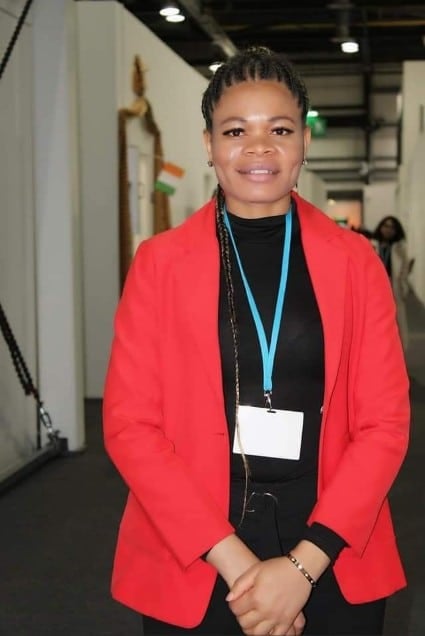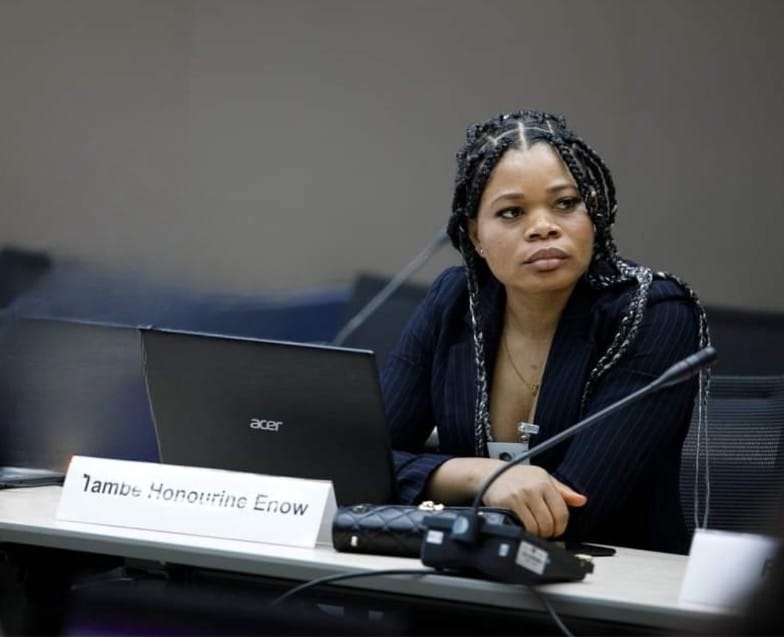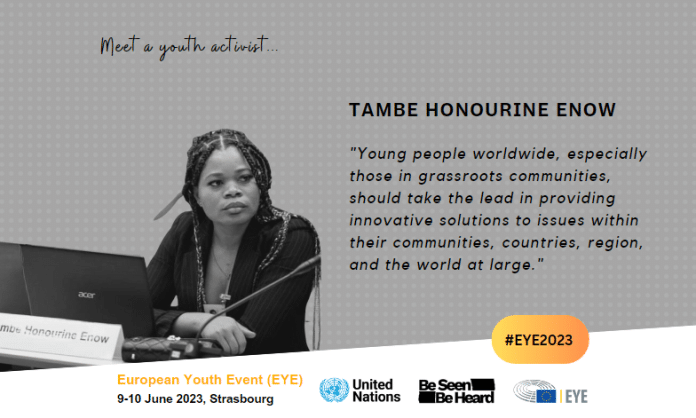In the run-up to the European Youth Event in Strasbourg on 9-10 June 2023, a bi-annual gathering hosted by the European Parliament, we interviewed four young activists participating in the event, about their work, ambitions and message to world leaders.
The UN in Brussels will be present at the European Youth Event and engage with these young leaders to address what they need for a more meaningful participation in politics and democracy.
 Studies: Currently a Ph.D. Student in Climate Change and Sustainable Development Policies at the University of Lisbon and NOVA University of Lisbon, Portugal, with a research interest in “Assessing the Water-Energy-Food Nexus for Sound Technology and Policy Recommendation to Tackle Food Insecurity in Cameroon and Nigeria. Holds a Postgraduate Diploma in Weather and Climate Modelling and a Master in Bioscience Engineering (Environmental Sanitation) from Ghent University, Belgium, and a Bachelor of Science in Environmental Science from the University of Buea, Cameroon
Studies: Currently a Ph.D. Student in Climate Change and Sustainable Development Policies at the University of Lisbon and NOVA University of Lisbon, Portugal, with a research interest in “Assessing the Water-Energy-Food Nexus for Sound Technology and Policy Recommendation to Tackle Food Insecurity in Cameroon and Nigeria. Holds a Postgraduate Diploma in Weather and Climate Modelling and a Master in Bioscience Engineering (Environmental Sanitation) from Ghent University, Belgium, and a Bachelor of Science in Environmental Science from the University of Buea, Cameroon
6 years of work experience at UNEP, the UN Climate Technology Centre and Network, Africa Climate and Environment Foundation (ACEF) and BFG Consulting and Services
Where do you live? Belgium
Where are you from? Cameroon
- What made you decide to become a youth activist?
My personal life experience inspired my journey to youth activism. I don’t want this to be a story that provokes pity, but I want it to be that which speaks of an ambitious, young and strong African lady from a rural community in Cameroon, who is now able to impact the world with motivation from her personal life experiences. I didn’t grow up in a wealthy family or community. I hail from Isangele-Bakassi, a very rural community on the boundary between Cameroon and Nigeria. In the early 2000s, my family relied on farming and fishing for livelihoods and streams for drinking water. Due to ignorance and the lack of alternative livelihood, my community used chemicals for fishing and practiced unsustainable agricultural techniques. Due to climate change and the chemical pollution of the peninsula, I witnessed first-hand the drying up of the stream we relied on for drinking, a decrease in precipitation, which affected agricultural productivity, and a significant decrease in the fish catch factor. These resulted in severe famine and the displacement of people from Isangele. The calamities that befell my community brought me to my knees and landed me in tears, and I decided I would advocate for actions that would address such issues in my community and similar communities across Africa. With an academic background in environment and climate science, I now understand that it took several years for our activities in the 90s and early 2000s to start affecting our livelihoods. Most of our parents who were championing these activities are no more. Therefore, the impact is being felt by the children of yesterday and the youths of today. This awareness made me passionate about making a positive difference in the world so as to preserve it for future generations, and I believe this can only be done by representing the voices of youths in rural communities in national and international negotiations on topics related to climate change, biodiversity loss, environmental degradation, and pollution. Youths in rural communities bear the brunt of the impact of climate change and other environmental issues, but their voices are underrepresented in these spaces. As a youth with similar life experiences as theirs, I strive to access these negotiation tables and influence policies that would protect such rural communities.
- Would you like to share an example of the impact of your work? What are you particularly proud of?
I strongly believe that exposure to international experiences builds young people’s confidence and makes them competitive amongst their peers. In addition, young people have the potential to transform their communities if they are given the necessary support. This motivated me to create an organisation that would serve as a platform to give exposure to grassroots youth and empower them to serve their communities. In 2021, I founded Africa Climate and Environment Foundation (ACEF), a youth-led organisation focused on mobilising and empowering African youths to take action for the climate and the environment and for sustainable development that would help bridge the hunger and poverty gap, mitigate climate change, protect the environment and conserve natural resources in Africa. Within two years of its existence, ACEF is officially registered in five countries with 5000 members across 22 African countries. ACEF is already accredited by several UN entities like UN Environment Programme, the UN Ocean Conference, UN-WATER, and the UN Conferences on Least Developed Countries. Through these accreditations, I have provided grassroots youths with access to participate in conferences organised by these UN entities. Prior, these young people had no access to these events. In 2022, I mobilised funds to send six grassroots African youths to COP27 in Egypt. This was the first time these young people travelled out of their countries and their first COP experience. One of the beneficiaries has now secured an Erasmus Mundus Scholarship to study MSc. in Environmental Science, Policy, and Management. Another beneficiary succeeded in securing a good job in an international organisation. With respect to community service, I developed a programme “Tackling the Triple Planetary Crisis (pollution/waste, biodiversity loss, and climate change) in Africa through Nature-based, Sound Waste Management, and Youth Empowerment”. Through this programme, we have removed several tons of waste (especially plastics) from the ocean, marine, and terrestrial environment in several countries in Africa; raised awareness on sound waste handling at home; created environmental clubs in schools, planted more than 50000 mangrove trees to sequester carbon and build resilience against windstorm and flooding as well as enhance biodiversity; promote the cultivation of seaweeds for ocean purification, biodiversity enhancement and production of cosmetics and biodegradable plastics. These activities have been a source of livelihood for community members who work with us.
Aside from providing grassroots African youths with an opportunity to gain experience and to serve their communities, I hope to motivate them to reach for the stars through my personal achievements. For example, in January 2023, I was selected by the Executive Director of the UN environment programme (UNEP) to join the Multidisciplinary Expert Scientific Advisory Group (MESAG) of the 7th edition of the Global Environment Outlook (GEO-7) Assessment. This group is made up of top-tier environmental experts from around the world, and it is responsible for providing advice to the UNEP Executive Director, Authors, Fellows, and Experts and to scrutinising the scientific credibility of the GEO-7 Assessment. I consider my selection to join this group of 30 experts, drawn from 179 nominations, an achievement, as I’m the only black woman of African descent on the board representing the African Group. I’m particularly proud of this achievement because I was selected not because I am a youth but because I’m an expert, given that the selection criteria gave considerations only to balance in discipline, region, and gender. This is a clear indication that there are experts among youths; thus, youths should be given the opportunity to lead. My selection to the MESAG board has motivated a lot of female African youths to want to further their education and reach for the stars.

- Where do you see yourself in five years?
Through my journey in activism and my academic and professional background, I have realised that we will not be able to keep the 1.5°C target alive if we don’t push policymakers. In addition, we must work together to achieve the 17 SDGs which are directly or indirectly interconnected with climate change. We have only 7 years left to meet SDGs. I want to spend the next five years ensuring we achieve the SDGs because it would improve the livelihoods/living standard of people in vulnerable communities. In the next 5 years, I see myself advising policy for national governments and at the international level that would address climate and environmental issues. I will use science, engineering, and knowledge from local citizens to ensure that whatever policy we come up with will address country-specific issues and promote sustainable livelihoods for grassroots communities. I do wholly believe that localisation of projects is needed. Therefore, in 5 years, I see myself working for a multilateral development organisation like the World Bank, UNICEF, UNDP, etc., leading their developmental projects in grassroots communities that consider climate and environmental integrity and prioritise youth inclusion.
- What message do you have for current leaders?
Although I’m a youth advocate, I’m also a scientist and an engineer with an in-depth understanding of the science behind climate change and environmental issues, as well as the suitable technologies and policies for addressing these issues. I want to tell our leaders that they should not only give us a seat at the table but also acknowledge our potential and accomplishments by listening to us and trying to implement some of the solutions we come up with. Young people are not future leaders like you always say; they are both present and future leaders. I believe in empowering young people by providing them with the necessary skills to develop innovative solutions. Youths are developing innovative solutions to the world’s pressing climate and environmental challenges. It is time for our leaders to empower, engage, listen, and implement the solutions they bring forth. Dear leaders, if you give us an opportunity, we assure you that we will work closely with you and bring about change because we are the largest demographic in the world. There is a huge potential for collaborating and working with us. We can move mountains if we work together. We are happy to sit down with you and engage you, but only if you are serious about listening to us and implementing the solutions we recommend to some of the challenges in the world.
- What message do you want to share with other young people?
Young people worldwide, especially those in grassroots communities, should take the lead in providing innovative solutions to issues within their communities, countries, region, and the world at large. We cannot continue to wait for our leaders to act because, 30 years from now, most of them will not be around, but the youths will be here to experience the adverse effect of climate change resulting from weak policies implemented today. I urge you all to stop fighting with the leaders in your country. Contact them and find a way to work together because the formulation and implementation of sound policies that can bring about significant change can never happen when we fight each other, and as youths, we stand to lose more. We must sit together, brainstorm, and find lasting solutions to climate change and environmental issues.




